Last Chance to Catch NYC's Holiday Notalgia Train
We met the voices of the NYC subway on our nostalgia ride this weekend!


Finalists in a competition to improve the Brooklyn Bridge‘s crowded design were recently revealed, offering a vibrant selection of reimaginings demonstrating what the bridge could be like in the future. The competition, which was organized by the Van Alen Institute and the New York City Council, accepted thousands of submissions from both young adults and professionals around the world. Six finalists were selected in total, and their work will be presented in a virtual design show down on Thursday, July 23 at 6 pm.
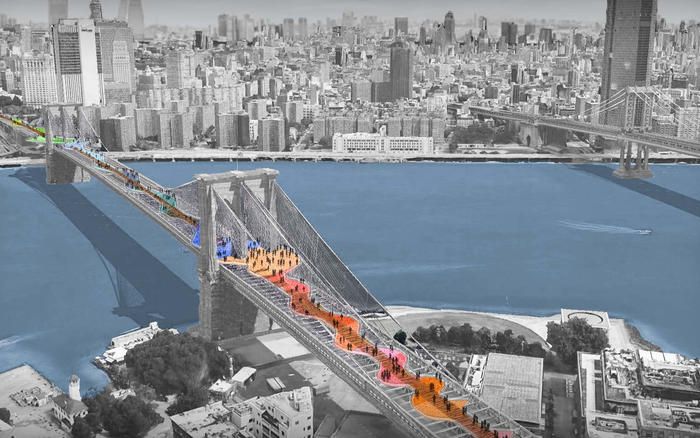 The Cultural Current; Aubrey Bader and Maggie Redding; Knoxville, TN.
The Cultural Current; Aubrey Bader and Maggie Redding; Knoxville, TN.
“With six lanes for traffic and one narrow, cramped right-of-way that pedestrians and cyclists must share, it’s clear that we haven’t been making the best use of the Brooklyn Bridge,” said Danny Harris, executive director of the nonprofit organization Transportation Alternatives and one of the competition’s jurors. “This design competition will expand the conversation about how to unlock this critical link, and as advocates fighting for a bike and pedestrian focused future, we’re glad to be a part of it.”
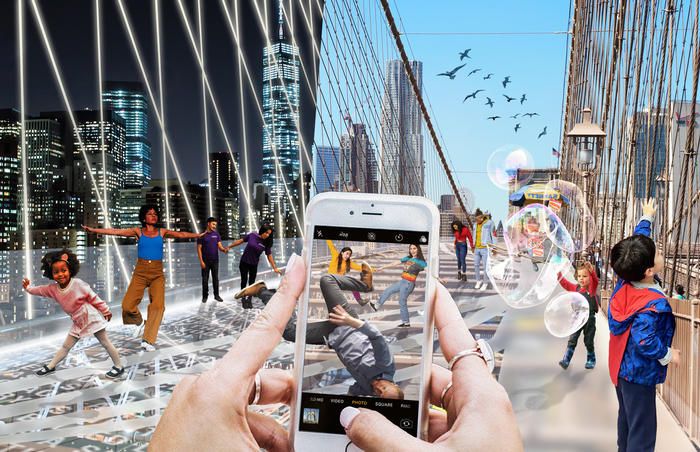 Do Look Down; Shannon Hui, Kwans Kim, and Yujin Kim; Hong Kong, Bay Area, CA, and New York.
Do Look Down; Shannon Hui, Kwans Kim, and Yujin Kim; Hong Kong, Bay Area, CA, and New York.
The competition began in February, yet was imbued with new meaning when the COVID-19 pandemic reached New York City a month later. “The Brooklyn Bridge is one of New York City’s architectural gems and a beloved landmark, but it’s less successful as aa functional public space,” said writer and editor Amy Plitt, also a competition juror. “And because of the COVID-19 pandemic, ensuring that the city’s public spaces are equitable, easily accessible, and safe for all is more than ever. I hope this competition will help kickstart the conversation about how to make the Brooklyn Bridge a better space for all New Yorkers.”
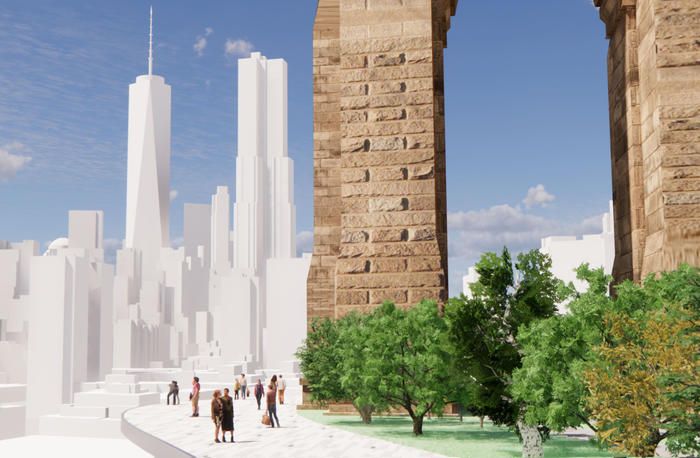 The Artery; Lukas Kugler; New Milford, CT.
The Artery; Lukas Kugler; New Milford, CT.
While the competition’s goals were universal, the finalists demonstrate just how varied approaches to the problem were. The proposal titled “The Artery” proposes that bridge be redesigned to incorporate separate pathways for cyclists, runners, and pedestrians, as well as allowing native plants and wildlife to give the bridge additional greenery. The “Brooklyn Bridge Forest” design takes this idea even farther, proposing that two biodiverse “microforests” be constructed at both ends of the bridge. “Brooklyn Bridge Forest” designer Scott Francisco of Cities4Forests tells us, “Our proposal is about engaging NYC in conserving the tropical rainforests through a community partnership in rural Guatemala. We are enlisting the bridge to become an icon of global forest conservation. The Microforests on the ground in Manhattan and Brooklyn are there partly to reflect this big global commitment.”
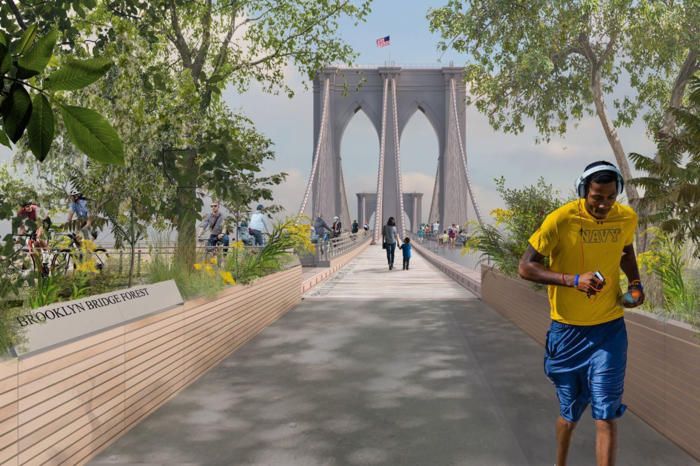 Brooklyn Bridge Forest; Pilot Projects Design Collective, Cities4Forests Wildlife Conservation Society, Grimshaw and Silman; New York and Montreal.
Brooklyn Bridge Forest; Pilot Projects Design Collective, Cities4Forests Wildlife Conservation Society, Grimshaw and Silman; New York and Montreal.
Other finalists offer even bolder alterations to the bridge’s current design. The “Do Look Down” proposal suggests that a glass surface be installed on the bridge’s current walkway. It also calls for the conversion of the lower roadway into additional walking space with kinetic paving that could harness the energy of passerby’s footsteps. Closing the bridge to car traffic is a common theme among many of the finalists, with the “Cultural Current” plan calling for the closure of the lower roadway in order to add new, colorful pedestrian paths. The “Back to the Future” design suggests that the bridge be returned to its original, 1883 state by removing cars and elevated ramps in order to facilitate bikes, trains, and pedestrians exclusively.
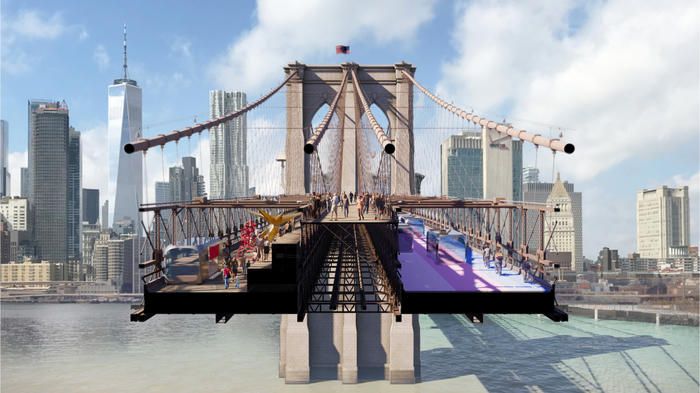 Back to the Future; BIG and ARUP; New York.
Back to the Future; BIG and ARUP; New York.
There are no current plans to adopt any of the winning designs, yet the involvement of the City Council means that the competition’s results will be viewed by public officials. It is also worth noting that a 1999 Van Alen Institute contest led to the construction of the red steps of the Times Square TKTX booth in 2008. So, there is always hope that these designs might someday become a reality.
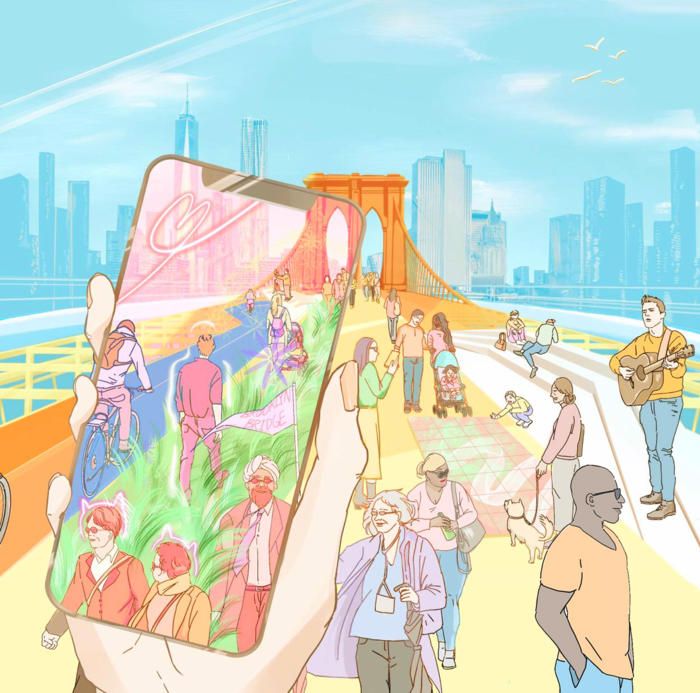 Bridge X; ScenesLab, Minzi Long, and Andrew Nash; New York, Boston, and Vienna.
Bridge X; ScenesLab, Minzi Long, and Andrew Nash; New York, Boston, and Vienna.
The Brooklyn Bridge is one of New York’s most recognizable icons and has historic significance that reaches back to its construction in the late 19th century. Its original iteration included two lanes for streetcars, two lanes for carriage traffic and the elevated pedestrian walkway. The bridge was also recently in the news when Black Lives Matter protesters crossed over the bridge, which was not the first time that the structure was used to stage a protest.
Next, check out the secrets of the Brooklyn Bridge and The Ghost Signs of Lower Manhattan
Subscribe to our newsletter